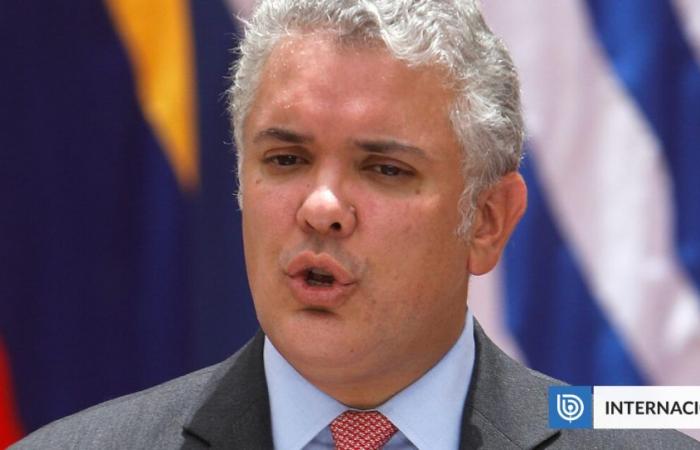
Several former Latin American leaders will participate this Tuesday in a posthumous tribute to the late president Sebastian Piñera, organized by the Freedom and Democracy Group. One of them is the former Colombian leader, Ivan Duque.
In this context, he spoke with Radio Bío Bío about the legacy of the businessman, who died last February after falling from a helicopter into Lake Ranco.
However, he also expressed himself about the situation of Latin American governments and how he sees the presidential elections in Venezuela.
– How would you evaluate this moment you are going through? the right in our country And also what role does former president Sebastián Piñera play in that context?
“Well, I believe first that Latin America today should be divided much beyond the conception of left and right and almost have a division between demagogues and pedagogues. The demagogues who sell bread for today and build hunger for tomorrow, who try to nationalize, who persecute the private sector, who generate uncertainty, who lead to low levels of growth, high levels of inflation and a massive loss of confidence.
And the pedagogues, who are the ones who promote investment, defend democratic valuesthe market economy, that do what is right and not what is popular and that are the ones that today have the best performing economies, the greatest growth, the greatest expansion of the middle class and the constant improvement of social conditions.
Sebastián Piñera did not do what was popular, but what was correct. He governed with management, thinking about the new generations, in the long term, in the future.
– Iván Duque, former president of Colombia
And I believe that in that environment Sebastián Piñera and his legacy, well, it is the legacy of a great pedagogue. Sebastián Piñera did not do what was popular, but what was correct. He governed with management, thinking about the new generations, in the long term, in the future. And that is why he often had to face low levels of popularity, but as time went by he was recognized for the assertive way in which he had carried out many tasks.
He was a person who achieved great recognition for his country not only for his public policies, but also also formed a generation of technocratsof managers and political leaders who will do a lot to talk about for the future of Chile.”
The situation in Latin America
– President, and for the situation at the level of Latin America, where we have the triumph of Javier Milei in Argentina. As a result of that, do you think that in Latin America perhaps the governments that are in power today in the countries of this continent are going to move to the right?
“I have never believed that politics is linear or that politics is a matter of replicas. I think that each country has its needs and each country has its leaders and its moments.
I believe that if one looks objectively at what President Milei is doing, he is applying the necessary shock therapy to lower inflation, to reduce the deficit, to promote confidence and to trigger growth. And I believe that the fact of having managed to get such an important piece of legislation for these purposes in Congress shows that his pedagogy is increasingly escalating, because Their decisions are not necessarily popular, but they are necessary. And I believe that the way in which he has managed to communicate with the country so that it understands this therapy is being truly successful.”
I believe that today the region is realizing that the so-called progressive discourse ended up becoming a poor model, because they have impoverished the countries, because they have generated uncertainty, because they have low levels of growth.
– Iván Duque, former president of Colombia
– Along the same lines, how do you project from your vision the governments that are coming for Latin America in the future?
“I believe that today the region is realizing that the so-called progressive discourse ended up becoming a poor model, because they have impoverished the countries, because they have generated uncertainty, because they have low levels of growth, because they do not stimulate the generation of new jobs, because they have looked with contempt on private investment in sectors such as education, health, in short. So, I believe that the progressive model is self-destructing, the so-called progressivism is self-destructing due to its demagogic management.
And I believe that each time we are seeing governments that build pedagogical trust. We see the case of President (Luis) Abinader in the Dominican Republic, we see the case of Daniel Noboa in Ecuador, we see the case of Javier Milei in Argentina, we now see the case of President José Raúl Mulino (Panama), the case of the President (Rodrigo ) Chaves also in Costa Rica, we are looking at the case of President (Irfaan) Ali in Guyana.
So, I think that the pedagogues who They defend the market economy, “freedom and security as a democratic value.”
The situation in Venezuela and the elections
– Regarding the situation in Venezuela, what should happen to that country after July 28? What should also happen to Nicolás Maduro in case he loses in these elections?
“I believe that first we must start from the base that what exists in Venezuela is a dictatorship and there we cannot speak of opposition but of democratic resistance.
We see Maduro’s desire to steal the elections one more time. He has disqualified María Corina (Machado), Corina Yoris, he has persecuted leaders of different parties. In the last few hours, there have been more than 35 captures of members of the democratic resistance teams. It has not allowed the entry of international observers.
But, we also see a very great citizen fervor and we see that the polls give majority support to the democratic resistance. So, unless the elections are stolen again, which is what Maduro wants, it is most likely that the people will speak out forcefully against him. What we must keep in mind is that they have not shown any willingness to hand over power and that is what makes the situation much more complicated.
Possibly, it would not seem strange to me that before the electoral process, if the government seems lost, as it seems to seem today, then that could lead them to suddenly look for a possible skirmish in Guyana to try to postpone the elections. So those are genuine concerns that I see there.”
We see Maduro’s desire to steal the elections one more time.
– Iván Duque, former president of Colombia
– In that context, what could be the role of the rest of Latin American countries in these elections in Venezuela?
“I believe, on the one hand, you cannot be obedient and I am concerned that I am seeing several governments that are playing at obedience with Maduro, that have viewed this electoral process in a timorous manner and have not promptly denounced everything that seems be a plan to steal the elections.
So I have no doubt that there will be some countries that share ideology with the Venezuelan regime or that have presidents who share ideology with the Venezuelan regime that They are going to try to legitimize the electoral process.
But, I believe that those of us who have been defenders of democracy and those who are in charge of other nations and are defenders of democracy, have to come out forcefully to report any theft and above all to promote true isolation of the regime and that severe sanctions be applied, because what cannot be is that the Venezuelan people are condemned to an evil of destruction, as has been the regime of Nicolás Maduro.”





